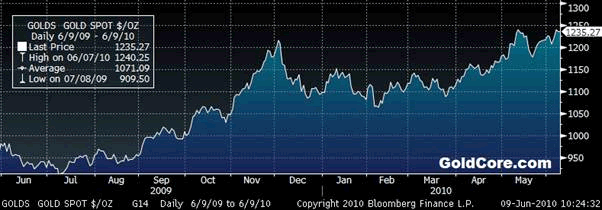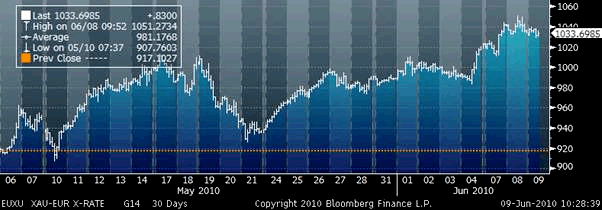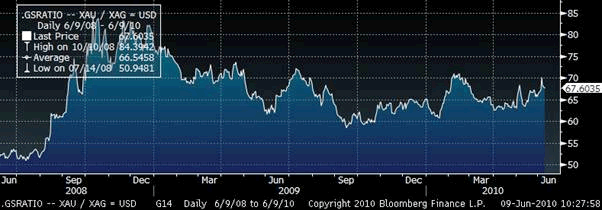Gold Consolidates Near Record Nominal Highs in Nearly All Currencies
Commodities / Gold and Silver 2010 Jun 09, 2010 - 06:45 AM GMTBy: GoldCore
 Gold rose to new record nominal highs in nearly all major currencies yesterday (record highs in US Dollars, euros, sterling, Swiss francs, South African rand, Indian rupees, Chinese renminbi/yuan etc) on growing concerns of sovereign debt contagion and concerns about the robustness of the global economic recovery. Concerns that large industrial nations with huge debt burdens will attempt to inflate away their debts thereby devaluing currencies is also leading to investment demand for the finite currency that is gold. Gold is currently trading at $1,236/oz and in euro, GBP, CHF, and JPY terms, at €1,035/oz, £855/oz, CHF 1,423/oz, JPY 112,870/oz respectively.
Gold rose to new record nominal highs in nearly all major currencies yesterday (record highs in US Dollars, euros, sterling, Swiss francs, South African rand, Indian rupees, Chinese renminbi/yuan etc) on growing concerns of sovereign debt contagion and concerns about the robustness of the global economic recovery. Concerns that large industrial nations with huge debt burdens will attempt to inflate away their debts thereby devaluing currencies is also leading to investment demand for the finite currency that is gold. Gold is currently trading at $1,236/oz and in euro, GBP, CHF, and JPY terms, at €1,035/oz, £855/oz, CHF 1,423/oz, JPY 112,870/oz respectively.

Gold in USD - 1 Year (Daily). Click on image to view full size.
Volatile financial and currency markets is leading to further diversification into gold and hence the record highs in nearly all currencies. Governments cannot print or digitally create gold unlike fiat currencies and this is leading to safe haven demand for gold. It is important to remember that these are only nominal highs and that adjusted for inflation gold remains less than half the price that it was in US dollars in 1980 - some $2,400/oz. The inflation adjusted high remains a long term price target. In the short term, gold needs to close above $1,250/oz prior to possibly challenging $1,300/oz in the coming days.

Gold in EUR - 30 Day (Tick). Click on image to view full size.
The notion that there is a 'gold rush' or 'gold mania' is incorrect. Gold's record highs in most currencies were greeted with little fanfare and barely reported in the business sections and business news of most mainstream media in the UK, Europe and the US. Rather it was only reported by the news agencies and specialist financial media such as Bloomberg and the Financial Times. The paucity of media coverage of gold's record highs is not indicative of mass mania or a massive bubble. Gold remains a fringe investment of those concerned about the health of the global economy and of the value of fiat currencies and is far from the investment of choice of mainstream investors. Also the notion that investors are 'piling' into gold is erroneous. Very few investors have any allocation to gold whatsoever (let alone piling into gold and being overweight gold in portfolios) and the gold market remains absolutely tiny vis-à-vis currency, bond, equity, property and derivative markets.
Recently we have had more buy orders than sell orders but there have been a significant amount of sell orders and those taking profits. Buy orders are coming from wealthy and high net worth clients (minimum order remains $10,000) so the increased buying is not from the man in the street or the average retail investor. Most retail investors do not know what a sovereign, Britannia or Krugerrand look like - let alone how much they cost.
Silver
Silver is currently trading at $18.27/oz, €15.30/oz and £12.64/oz. Silver surged 1.5% yesterday and is up sharply in recent days which has seen the gold silver ratio fall to 67.6035. Silver remains very undervalued versus gold and the ratio will likely continue to fall and the much smaller silver market should continue to outperform gold.

Platinum Group Metals
Platinum is trading at $1,530/oz and palladium is currently trading at $446/oz. Rhodium is at $2,475/oz.
News
Demand for gold coins is tightening supplies and boosting premiums as mounting concern over Europe's debt crisis and a proposed increase in UK capital-gains tax spur purchases, according to GoldCore Ltd.
Wholesale premiums on British sovereigns, added to the price of immediate-delivery bullion, have jumped to about 7 percent from as little as 2.5 percent in early May, the broker and dealer said. For the more popular Krugerrands, they have risen between 1 percent and 1.5 percent in the past month. May bullion sales almost tripled from a year earlier, GoldCore said.
Gold climbed to a record $1,252.11 an ounce in London yesterday on investor demand for an alternative to currencies and on speculation that debt-cutting measures across Europe will slow growth. Gold sales to Europe from the Perth Mint in Australia surged in May, and South Africa's Rand Refinery Ltd. raised production of blank Krugerrands to a 25-year high.
"We're finding it difficult to get sovereigns in large volumes," Mark O'Byrne, executive director of GoldCore in Dublin, said yesterday by phone. "People see the crisis getting worse, not better, and demand is increasing. There's still a bit of doubt in the market about the capital-gains tax, and sovereigns are exempt" from the levy, he said.
Tax Rates
UK Prime Minister David Cameron said June 7 his government must raise capital-gains tax to stop a "massive leakage" of revenue. Gains on non-business assets will be taxed at rates "closer to those applied to income," according to the Conservative-Liberal Democrat coalition's legislative program published last month.
The basic income tax rate is 20 percent, with higher rates at 40 percent and 50 percent. Capital gains are now taxed at 18 percent. Changes will be unveiled in the budget scheduled for June 22, according to Cameron.
Gold is up 14 percent this year and set for a 10th annual gain, the longest winning streak since at least 1920, as investors seek to safeguard their wealth against the crisis in Greece and other European countries struggling to repay debt. The euro has slumped 16 percent against the dollar this year, while the MSCI World Index of shares is down 11 percent. The metal traded at $1,237.35 an ounce at 6:27 a.m. in London.
"Normally, premiums have small moves," O'Byrne said. "For some to double in a matter of weeks is quite a signal."
European buyers accounted for 69 percent of purchases last month, compared with 51 percent a year ago, according to Perth Mint. Rand Refinery said output at the end of May jumped 50 percent to 30,000 ounces of blank coins for minting, the highest weekly production since 1985. Demand was strong enough to constitute "panic buying," Muenze Oesterreich AG, the Austrian mint that makes the Philharmonic coin, said on May 12.
A South African Krugerrand weighing 1 ounce costs 946.33 pounds ($1,362.53), according to GoldCore's website. The Krugerrand is the world's most widely held and actively traded gold coin, Rand Refinery's website shows (Bloomberg).
As gold hits record, central banks are in focus as indications emerge of a shift out of the euro and into safer assets.
Gold's surge to a record sparked speculation that central banks may be stepping up purchases of the precious metal. Gold contracts for June delivery rose $4.70, or 0.4%, to $1,244 a troy ounce, a record settlement price on the Comex division of the New York Mercantile Exchange. Gold also hit an intraday record, surging to $1,252.10. In euro terms, the metal also hit a record of €1,042.94 ($1,242.87) in the London market, a gain of 2.5%.
The metal has surged over worries about Europe's debt woes and the slumping value of the euro. Investors in metals and currency markets have been on alert for any sign that the world's central banks, and China in particular, are shifting reserves out of the euro and into gold. Though central banks typically are coy about investment decisions, there have been signs lately that they might be shifting out of euros and into gold.Russia's central bank, one of the world's largest holders of foreign-currency reserves, trimmed its currency reserves by $6.6 billion in May, according to data on the bank's Web site, but increased its gold reserves by $1.8 billion.
Last week, an Iranian news agency said the country had begun switching €45 billion of its foreign-currency reserves into gold and dollars, a report that was unconfirmed.
"You won't see major players be blatant about increasing their gold exposure and reducing their euro exposure, but it is a trend we've been witnessing in the past few months," said Kathy Lien, director of currency research at GFT Forex in New York. "For the most part, whether they openly admit it or not, central banks are increasingly worried about their exposure to euros."
Central banks would be joining a buying binge by individual investors who have piled into coins and exchange-traded funds.Central banks were net buyers of gold in 2009, according to the World Gold Council. India alone purchased 200 tons of gold from the International Monetary Fund. But appetite appeared to wane as gold traded at record levels.
What has changed recently is that gold has shown its "relatively attractiveness" against other assets, particularly for central banks in emerging markets, said Natalie Dempster, director of the World Gold Council. Central banks and other large investors also are buying Treasury bonds and Swiss francs, other signs of an effort to preserve capital, Ms. Lien said. Some European investments, such as German bunds, are relatively secure, arguably safer havens than gold or Treasurys. But the range of safe European options has dwindled in recent months as debt turmoil has spread, and the size of the German bond market isn't large enough to accommodate the rising global demand for safe assets, forcing central banks and large investors to look elsewhere, according to Alan Ruskin, global head of currency strategy for RBS Securities in Stamford, Conn.
"This is a beginning, I am afraid," said Andy Smith, a senior metals strategist at Bache Commodities Group in London. "Gold is reflecting so many things that could possibly go wrong" (Wall Street Journal).
This update can be found on the GoldCore blog here.
Mark O'Byrne
Director
IRL |
UK |
IRL +353 (0)1 632 5010 |
WINNERS MoneyMate and Investor Magazine Financial Analysts 2006
Disclaimer: The information in this document has been obtained from sources, which we believe to be reliable. We cannot guarantee its accuracy or completeness. It does not constitute a solicitation for the purchase or sale of any investment. Any person acting on the information contained in this document does so at their own risk. Recommendations in this document may not be suitable for all investors. Individual circumstances should be considered before a decision to invest is taken. Investors should note the following: Past experience is not necessarily a guide to future performance. The value of investments may fall or rise against investors' interests. Income levels from investments may fluctuate. Changes in exchange rates may have an adverse effect on the value of, or income from, investments denominated in foreign currencies. GoldCore Limited, trading as GoldCore is a Multi-Agency Intermediary regulated by the Irish Financial Regulator.
GoldCore is committed to complying with the requirements of the Data Protection Act. This means that in the provision of our services, appropriate personal information is processed and kept securely. It also means that we will never sell your details to a third party. The information you provide will remain confidential and may be used for the provision of related services. Such information may be disclosed in confidence to agents or service providers, regulatory bodies and group companies. You have the right to ask for a copy of certain information held by us in our records in return for payment of a small fee. You also have the right to require us to correct any inaccuracies in your information. The details you are being asked to supply may be used to provide you with information about other products and services either from GoldCore or other group companies or to provide services which any member of the group has arranged for you with a third party. If you do not wish to receive such contact, please write to the Marketing Manager GoldCore, 63 Fitzwilliam Square, Dublin 2 marking the envelope 'data protection'
GoldCore Archive |
© 2005-2022 http://www.MarketOracle.co.uk - The Market Oracle is a FREE Daily Financial Markets Analysis & Forecasting online publication.



